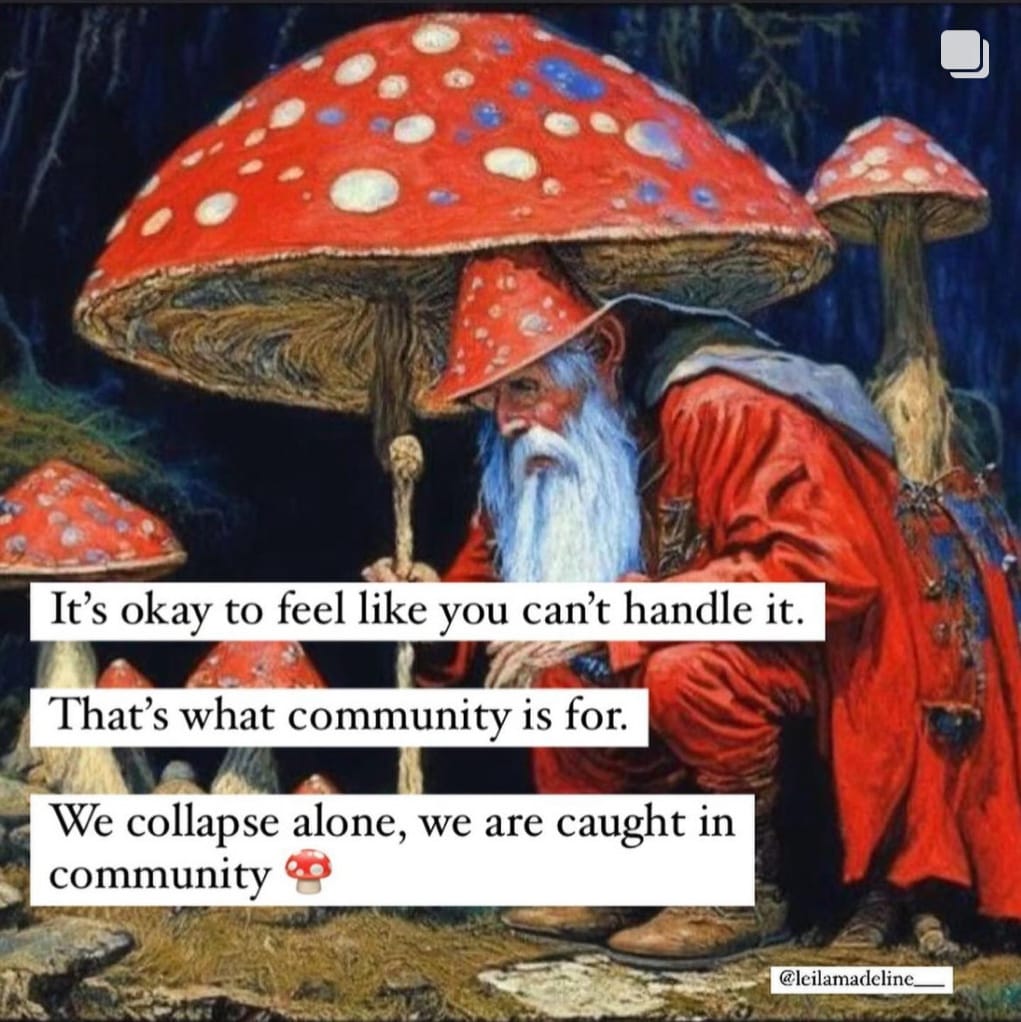Responding to Crisis
I saw this meme on Instagram the other day that reads, "It's okay to feel like you can't handle it. That's what community is for. We collapse alone, we are caught in community."

This year has been a wild one for my family. Five months ago, my parents were in a terrible accident while on vacation out of state. It was the biggest crisis situation I've ever had to deal with, and we're still feeling the repercussions of it (and will continue to feel them for a long time). It was a terrible experience that I wouldn't wish on anyone, but it also fundamentally changed my instinctive reactions to being in crisis.
For most of my life, I have responded to crisis by withdrawing into myself, putting up emotional walls and holding other people at arm's length. I would dig in my heels and insist that I had things under control and could manage by myself. And that was...mostly true, I guess. I'm tough, resilient, resourceful.
But I've been learning lately, through a lot of work in therapy and a lot of beautiful relationships, that humans are not meant to exist in isolation, even when the human in question is a massive introvert, like me. We are fundamentally a social species and are meant to be in community. And so, I've been trying over the past few years to reach out when I'm in crisis, rather than withdrawing. It was hard work every time—I had to consciously stop myself from retreating into self-imposed isolation, and to say, "I could use some help with this."
In the aftermath of my parents' accident, I began to notice some major shifts in how I was coping with crisis. For one thing, I decided that the right thing to do was to drop everything at home and travel to where they were to help. In the past, when I left home, I would worry about my partner and our dog, that they might struggle without me there. This time, when my absence was going to be indefinite (and, therefore, I expected, more anxiety-inducing), I found I was able to let go of that worry. I was able to trust that my partner would lean on their resources here, and that our community would catch us, wherever we collapsed.
And catch us they did. There were the friends who listened as I talked through my initial panic, who checked in and sent me cute pictures of their pets and kids. There were gift cards for food delivery and reminders to eat and drink water. And when we needed to start a GoFundMe to get my parents home, they showed up—and then, not just my community, but my parents' communities, friends of friends, people who hadn't seen or talked to my parents in years, people who had never met my parents but were moved by their story.
I've said it many times in many places: I felt a lot of things in the aftermath of the accident, but "alone" was never one of them.
This past week, a different part of my family has found themselves in crisis. My partner has been more directly managing this one while I've been taking care of the dog. And in the midst of this crisis, I realized something: my immediate instinct was not to say, "I've got this." My immediate instinct was to reach out, to seek connection with our communities. It wasn't a struggle. It felt like the most natural thing in the world.
I think I've somehow, finally, started to internalize the idea that I am inherently worthy of the same care as any other human being. That my friends and family love me as much as I love them. That the people I've chosen are the ones who choose me back. I know I can trust my communities catch me, because they've done it before, over and over.
And sure, I could probably survive this on my own. But...why? Why put myself through that sort of additional stress in an already stressful situation? I want my friends to reach out to me when things are hard. I want to be able to support them in the way they want to be supported. And I'm finally trusting that they want to do the same for me.
As I told a friend last night: sometimes, the work pays off.
